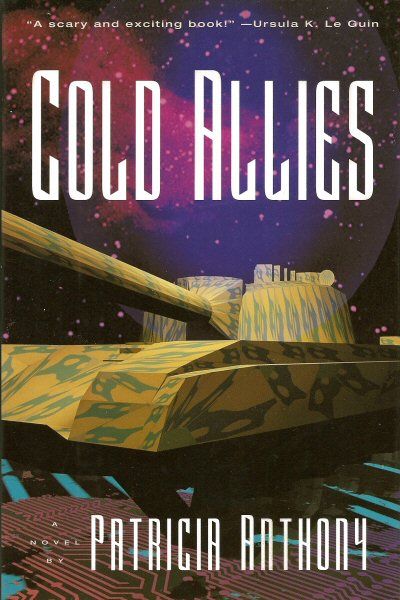Wartime First Contact
Cold Allies
By Patricia Anthony

8 Sep, 2015
0 comments
1993’s Cold Allies was the late Patricia Anthony’s debut novel. It was followed by six more novels over the next five years: Conscience of the Beagle (1993), Happy Policeman (1994), Cradle of Splendor (1996), God’s Fires (1997), and Flanders (1998). After Flanders, silence save for one short story, 1999’s “Mercy’s Children”, and one posthumous novel, The Sighting, published by Wildside in 2015.
Cold Allies introduces us to a 21st century transformed by abrupt and dramatic climate change. Desperate economic migrants flee across North America only to find themselves confined to camps or worse. In the Old World, new armies follow ancient invasion routes to win a new homeland for themselves.
Climate change, agricultural collapse, and invasions are only part of the story. There are also the aliens.…
North from Spain and westward from the Black Sea, poorly equipped but highly motivated soldiers of the Arab National Alliance make their way across Europe. Plagued by infighting, a lack of fuel, and basic incompetence, the armies of Europe are enjoying as much success against the invaders as the Iberians did in the 8th and the Poles did in the 17th century. If there are any modern analogs to Martel or to Sobieski, they have not come forward.
Europe’s nations cannot look abroad for their salvation. Europe’s American allies have their own problems at home and their own agenda in; what serves the US best may not be in Europe’s interests at all. The Russians offer (unreliable, untrustworthy) intelligence, but keep their oil for themselves, bidding to remain neutral in the great conflict.
But cold blue lights have been appearing in the skies across the world: signs that humanity has been discovered by a race far more powerful than we are. Here and there, the aliens take an interest in humans. Some they kill in peculiar, terrible ways. Others they protect. If the aliens can be convinced to intervene on the side of the Europeans, perhaps the invasions can be stymied.
But even if the communication barrier can be overcome, who can understand the workings of alien minds?
~oOo~
I have to admit that I found large swaths of Anthony’s scenario unconvincing. OK, granting that Middle Eastern and Russian oil is off the table for the European armies, what about oil-producing nations like Canada, Venezuela, and Mexico? And while the ANA is highly motivated, all their cool toys were purchased from the people they are invading. Although … I think the ANA’s high command does understand that they have to win fast or not at all.
Other, later Western writers have imagined Arab invasions of Europe. Their scenarios are often racist or Islamophobic. This book is not nearly as nastily racist as it could easily have been. Anthony understands that there are many political divisions among Arabs and religious divisions among Muslims. The invaders are not as one-note as one might expect from modern milSF novel. Many of the senior officers are ambivalent about the theological extremes that drive some of their troops. The invasion itself is driven by need, not religious fervour; without that driving need, relations might be very different. The Arabs aren’t simply faceless hordes or vicious villains.
Anthony juggles a fairly large cast of POV (point of view) characters here: Sergeant Gordon Means (an RPV pilot too attached to the robot he controls), Lt. General Valentin Baranyk (desperately trying to defend Ukraine despite unreliable allies and a lack of resources), Lieutenant Justin Searles (an involuntary guest of the aliens, Captain Rita Beaudreaux (who gets to enjoy the delights of war-zone medicine), Linda Parisi (a disreputable SF author eager to exploit the situation for her own benefit), Jerry (an American internal refugee), Colonel Qasim Abdel Wasef (one of the senior ANA officers), and others. It’s easy to do this sort of cast of thousands approach badly (just read any Turtledove in one of his bloated alternate history series) but Anthony knows how to create vivid characters in a few words.
Somewhat to my surprise, I appreciated Anthony’s craft without particularly warming to the result. As I recall, this was true of most of the Anthony novels I have read. I am not sure why I feel this way. Lacking a reason I can articulate, I cannot justify not liking this more. It’s a puzzler.
I had a heck of a time tracking down a copy of Cold Allies before I discovered it was for sale from Kobo. My version is copyright 2015 and was published by Event Horizon Books. Oddly, enough, I cannot find this particular book listed on their site. Another puzzler.
